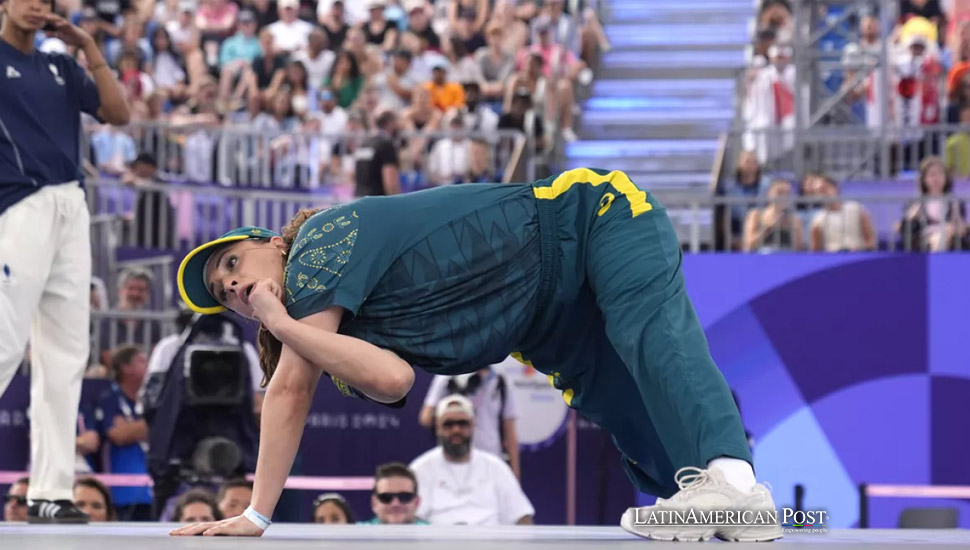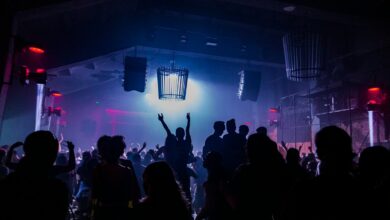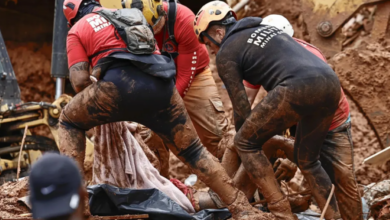Breakdancing’s Olympic Farce: How It Stole the Spotlight from Latin America’s True Athletes

The controversial rise of Raygun, the viral Olympic breakdancer turned World No. 1, has spotlighted how breakdancing’s inclusion in the Olympics has tarnished its reputation. This fiasco also robbed deserving Latin American athletes of their rightful moment on the global stage.
When breakdancing, or “breaking,” made its Olympic debut at the 2024 Paris Games, the intent was to introduce a new sport to a global audience and give it the recognition of Olympic prestige. However, instead of inspiring respect, the sport quickly became a viral joke when one competitor, Rachael Gunn, also known by her breakdancing name “Raygun,” became infamous for a lackluster performance that turned her into a meme sensation. Despite losing her matches 54-0, Raygun has since bizarrely ascended to the No. 1 spot in the world rankings for breaking, exposing deep flaws in the sport’s governing body and qualification systems.
While some might laugh at the absurdity of it all, the consequences are severe. This debacle damaged breakdancing’s credibility and hurt legitimate athletes—particularly in Latin America, where the Olympic stage is seen as a once-in-a-lifetime chance for athletes to shine. The overwhelming focus on the circus of breakdancing has overshadowed the dedication and hard work of athletes from the region, who are often sidelined by bizarre Olympic quirks and questionable selection processes.
The Impact on Latin American Athletes
The 2024 Olympics should have been a moment to celebrate the dedication and achievement of Latin American athletes across various sports. Instead, much of the media attention was hijacked by the spectacle of breakdancing’s strange Olympic debut, leaving athletes from the region fighting for scraps of recognition.
Consider the case of Venezuelan gymnast Jessica López, a celebrated and highly skilled athlete who has spent years honing her craft. López, like many other Latin American athletes, competed in a sport with a long Olympic history and stringent qualification processes. Unlike breakdancing, gymnastics involves years of technical mastery and rigorous competition to earn a place at the Games. But López’s accomplishments were overshadowed by the noise surrounding viral clips of a breakdancer flailing on the floor, turning a once-proud Olympic event into something closer to reality TV.
Meanwhile, promising athletes from Brazil’s taekwondo team, Argentina’s wrestling squad, and Mexico’s track-and-field competitors were left out as media coverage centered on breakdancing, detracting from their performances and stories. Latin America, which already faces challenges in gaining international recognition for its athletes, was hit particularly hard by this unfortunate Olympic circus. For athletes whose only global spotlight is the Olympics, the skewed attention toward breakdancing meant their hard-earned moments were diminished.
The Bizarre Rise of Raygun and Its Consequences
To understand just how bizarre the rise of Raygun has been, it’s essential to take a closer look at the world of Olympic breakdancing and the flawed system behind it. Despite her underwhelming performance in Paris, where she lost all her dance-offs without scoring a single point, Raygun still found herself crowned the No. 1 breaker in the world. This confusing outcome is a product of the World DanceSport Federation’s (WDSF) bizarre ranking system, which prioritizes past competitions, even when recent results are more reflective of current skill levels.
Raygun’s sudden rise to the top underscores a more significant issue—Olympic sports are supposed to celebrate the best athletes in the world. Yet, this system allowed someone who became a viral meme for her poor performance to claim the top spot. It’s no wonder that Japan’s B-Girl Ami, who won gold at the Games, is notably absent from the top rankings, as are other medalists. The situation is so strange that even the WDSF issued a statement advising people to “interpret” the rankings cautiously, essentially admitting the situation’s absurdity.
This mishap reveals a dangerous precedent. When the Olympics allow such glaring inconsistencies and oddities in their events, it delegitimizes the competition as a whole. Worse yet, it devalues the tireless efforts of athletes from countries like Colombia, Cuba, and Peru, who have spent years preparing for this moment, only to be overshadowed by a global joke.
A Distraction from True Athleticism
Breakdancing’s arrival on the Olympic scene was meant to inject a fresh element into the Games, appealing to a younger, urban audience. But instead of inspiring admiration, it has become a cautionary tale of how poorly managed sports can undermine the credibility of the entire Olympic movement.
For example, Ecuadorian weightlifter Neisi Dajomes won a historic gold medal for her country in Tokyo 2020. Her victory marked a significant moment for both her country and for female athletes in Latin America. However, when athletes like Dajomes are forced to compete for attention against viral memes like Raygun, their achievements can easily be lost in the noise.
Similarly, Argentina’s top rowers and sailors, who have consistently performed at a high level, face an uphill battle in gaining recognition in an already crowded Olympic landscape. With breakdancing grabbing headlines for all the wrong reasons, these deserving athletes find their performances overlooked, their hard work eclipsed by a sport that some consider more performance art than actual competition.
In contrast, Latin American athletes in traditional Olympic sports have earned their spots through grit, discipline, and countless sacrifices. The decision to elevate breakdancing—a sport many view as more subjective and less physically demanding than traditional Olympic events—diminishes the accomplishments of athletes who have overcome significant obstacles to represent their countries on the world stage.
The Bigger Problem with Olympic Novelty Sports
Raygun’s strange ascent to the top of the world rankings isn’t just an isolated incident—it’s symptomatic of a more significant problem with introducing “novelty” sports into the Olympic Games. Over the past few decades, the International Olympic Committee (IOC) has sought to keep the Games relevant by including trendy sports like skateboarding, surfing, and breakdancing. While these additions are intended to attract younger viewers, they risk undermining the traditional values of the Olympics, which emphasize excellence, fairness, and athletic achievement.
Latin American athletes, many of whom come from countries where Olympic funding is limited, are disproportionately affected by this trend. Unlike their counterparts in wealthier nations, athletes from the region often rely on the Olympics as their primary opportunity to showcase their talent to a global audience. Including novelty sports like breakdancing—where the line between sport and entertainment is blurred—means these athletes must compete against each other and viral sensations and meme-worthy moments.
This shift toward spectacle over substance threatens to dilute the integrity of the Olympics, turning what was once the pinnacle of global sporting competition into something resembling a reality TV show. While novelty sports may attract short-term attention, they do little to honor the hard work and dedication of athletes who have trained their entire lives for this moment.
The Need to Recenter the Olympics on True Athletes
For the Olympics to regain their prestige, they must refocus on the athletes who embody the spirit of the Games—athletes who have dedicated their lives to perfecting their craft, overcoming personal and systemic challenges, and representing their countries with pride. This is particularly true for Latin America, where athletes like Brazilian gymnast Rebeca Andrade and Cuban boxer Julio César La Cruz have become national heroes through their Olympic achievements.
The focus on breakdancing and other novelty sports risks overshadows the stories of athletes who have worked to compete at the highest level. If the Olympics are to remain a meaningful and respected event, they must prioritize the athletes who have earned their place on merit rather than those who have become viral sensations through a quirk of the system.
Moreover, governing bodies like the IOC must ensure that their qualification and ranking systems are transparent and fair so that athletes like Raygun don’t find themselves in positions of prominence through loopholes or obscure bylaws. Latin American athletes, many of whom already face challenges securing funding and support, deserve a level playing field where their hard work is recognized and rewarded rather than overshadowed by gimmicks.
The True Olympic Spirit vs. The Circus of Breakdancing
The rise of breakdancing in the Olympics, epitomized by Raygun’s viral rise to the top of the world rankings, has highlighted the dangers of turning the Games into a spectacle at the expense of actual athletic achievement. This trend is particularly damaging for athletes from Latin America, who rely on the Olympics as their primary stage. The focus on novelty sports like breakdancing detracts from the accomplishments of athletes who have dedicated their lives to their craft, undermining the values the Olympics are supposed to represent.
Also read: The Rise of Hockey in Latin America and the Caribbean
If the Olympics are to maintain their integrity, they must return to their roots—celebrating the best athletes in the world, regardless of sport or nationality. Latin American athletes, who have long fought for recognition on the global stage, deserve nothing less.





